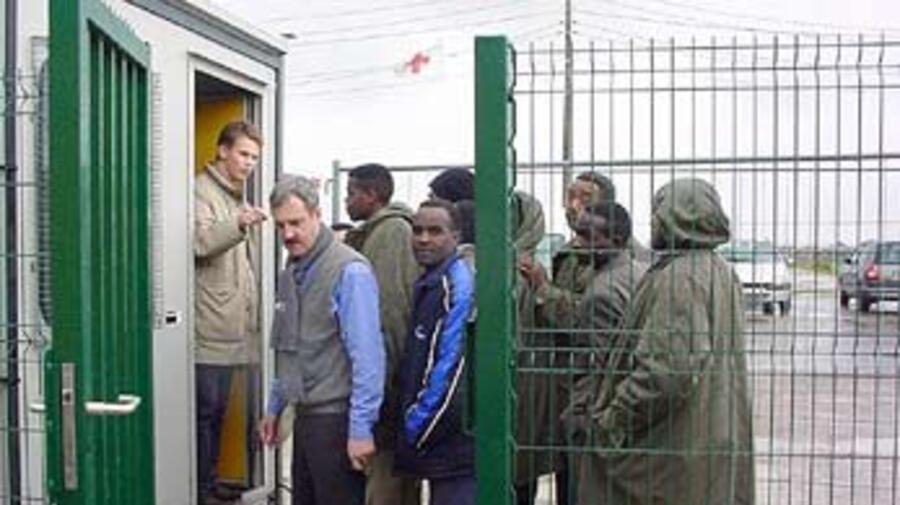Lubbers warns of deteriorating standards in EU asylum directive
Lubbers warns of deteriorating standards in EU asylum directive

Asylum seekers in Europe stand to lose out if increasingly restrictive national asylum legislation is adopted into the EU's common asylum system.
GENEVA, Nov 24 (UNHCR) - As European Union ministers meet this week to discuss the next step towards a common asylum system, the UN refugee agency has warned that a crucial piece of EU asylum legislation now under discussion is in danger of succumbing to the "lowest common denominator effect" that could erode international standards for the protection of refugees and asylum seekers.
Days before a November 27 meeting of EU Interior Ministers in Brussels, UN High Commissioner for Refugees Ruud Lubbers has written to Italian Prime Minister Silvio Berlusconi, current holder of the EU Presidency, to express his concerns about the Asylum Procedures Directive.
"The Asylum Procedures Directive should aim at high standards of refugee protection and should strive for a truly meaningful level of harmonisation. I regret to say that ... there has been further substantial deterioration of the draft directive on both these counts," wrote Lubbers.
If this process continues, he added, "I fear that this directive will be reduced to a catalogue of optional provisions, including significant departures from accepted international refugee and human rights law and principles established over more than 50 years."
The High Commissioner stressed that UNHCR has been very supportive of the EU harmonization process. The agency has endorsed, with important exceptions, three out of the five main elements of the system - directives on reception conditions and temporary protection, and the so-called Dublin II Regulation. The remaining two elements - directives on the key fundamental issues of asylum procedures and the definition of who qualifies as a refugee - have yet to be finalised.
In his letter, Lubbers suggested that if the text of the Asylum Procedures Directive was not significantly improved, it might be better to take it off the table altogether, until "a more propitious moment".
He drew attention to what has been commonly referred to as the "lowest common denominator effect", whereby the EU states - which have to approve the text unanimously - all insist on preserving the most restrictive elements of their own national legislation.
A majority of EU states have made significant changes to legislation affecting refugees and asylum seekers in the past couple of years, or have major revisions pending - even while the harmonization process was underway. This has accentuated the tendency for each state to try and make the directive reflect or permit its most recent and most restrictive elements.
In an Aide Mémoire attached to the letter, UNHCR listed eight elements of the directive it was concerned about. It focused in depth on three that are currently believed to be under negotiation - "safe countries", border procedures and the right to remain during an appeal.
The "safe countries" element of the draft directive could result in asylum seekers being sent to countries with insufficient guarantees for their effective protection, or to countries where they have never even set foot.
Under the "border procedures" element, people applying for asylum at the border after coming from supposedly safe countries may be denied access to the asylum procedure and the territory altogether, without verification that they will be safe and that their claim will be heard elsewhere. In the absence of such safeguards, there is a risk that they could be subject to chain deportations back to dangerous situations, which would be at variance with international refugee law.
"In UNHCR's view, it is only logical and fair that all asylum seekers, irrespective of whether they apply at the order (including air and sea ports) or further inside a country, benefit from the same basic principles and guarantees," noted the refugee agency in the Aide Mémoire.
"The 'safe third country' concept and the border procedures as outlined in the draft directive will serve to shift the burden from EU Member States to countries further afield," added Lubbers in his letter. "This will do little to convince states in regions of origin and transit that Europe is serious about establishing global border- and responsibility-sharing arrangements."
For asylum seekers who manage to get into the asylum procedure but are rejected after their first application, the directive defines 15 categories of cases in which the EU states can derogate from their right to remain in the country while their cases are being reviewed.
"The number and range of these exceptions are so broad that in effect they become the rule," said the Aide Mémoire. "They go beyond what could be considered 'manifestly unfounded' or 'clearly abusive' cases - and may equally affect refugees who are confused, traumatised, or simply ill-informed about the asylum process."
UNHCR noted that in several EU countries, 30-60 percent of refugees are recognised only after their initial rejection is overturned on appeal. So the possible forced return of such a wide range of people before their appeal is heard "would mark a serious deterioration of standards in most EU states and greatly increase the probability of miscarriage of justice."
The refugee agency also pointed out that about 75 percent of the 20 million people of concern to the agency - including refugees and asylum seekers - are living in the developing countries. Recent statistics have also shown that in the first half of 2003, the number of asylum seekers arriving in the EU has decreased considerably over previous years, while the overall rate of new asylum applications is much lower than during the early 1990s.





